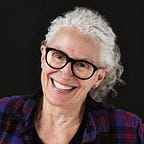The evolution of the mighty micro-VCoL
This year (2023–2024), Lectica (the nonprofit that owns me) is offering a celebratory edition of our post-graduate-level course, Foundations of Lectical Assessment. In essence, this course is the long academic answer to the question, “What are the origins of the mighty micro-VCoL?”
Since few of my readers will be able to attend this course, I’m offering a short list of some of the core ideas that contributed to the evolution of the micro-VCoL. You’ll see that I’ve included links to resources that unpack some of the ideas.
Please note that the sources cited here are not exhaustive. They represent a sample of the research and thought that led to the development of micro-VCoLing, skill mapping, and Lectica’s approach to curriculum development. It’s difficult, in retrospect, to know how much of that journey was influenced by these sources and how much of it has been influenced by sources I’ve forgotten and a quarter century of research and practice.
The big ideas behind micro-VCoLing
Zone of proximal development
This is the ideal zone for learning. It is the zone in which a learning challenge is just right for extending a particular learner’s level of understanding or skill (Lev Vygotsky, Jean Piaget).
Integration & differentiation
Learning takes place through processes of integration and differentiation. In other words, we learn by adding information when it fits neatly into our current knowledge or reorganizing our current knowledge when new knowledge doesn’t fit (Jean Piaget).
Reflecting (or reflective) abstraction
Reflecting abstraction is an unconscious mental activity that processes the results of an action (actual or imagined) in a way that suggests a possible next action (Jean Piaget, page 4). The example I often use involves one of my daughters learning to stand on her own. She begins by standing while holding onto the coffee table. When she lets go, she loses her balance and falls to the floor. The next time she tries, it takes longer to lose her balance. She makes progress because, with each attempt, she learns something that causes her to try something a little different the next time. I like to think of reflecting abstraction as part of a built-in unconscious feedback loop.
Learning is interactive
The mind develops through interactions with the physical and social worlds (Jean Piaget, Lev Vygotsky, Albert Bandura, Mike Mascolo).
Learning & emotion
Thinking and learning are inherently emotional and social (Mary Helen Immordino Yang).
Embodiment
Through embodied practice, we recruit kinesthetic, sensory, affective, and thinking processes (Kurt Fischer, Michael Mascolo).
Usable knowledge
New information becomes useful through practice. Usable knowledge = skill (Kurt Fischer).
Micro-development
We learn (build skills) at the micro-level. Micro-learning is bumpy. It takes time and practice to build, consolidate, and generalize skills (Nira Grannott).
Flow
People are happiest when their minds are fully engaged (Mihaly Csikszentmihalyi).
The dopamine-opioid cycle
The dopamine-opioid cycle is a built-in motivational cycle in the brain. It keeps us addicted to learning when we’re learning the way the brain is designed to learn, and it’s the reason we experience flow when our minds are fully engaged (Roy A. Wise).
The Goldilocks zone
This is the range in which what we’re learning is just challenging enough to keep the dopamine-opioid cycle ticking along (Theo Dawson).
Learning as play
The physical and social play of childhood establishes the foundation required for future learning (Jean Piaget, Maria Montessori). Optimal learning is inherently playful. Healthy play involves the whole person and recruits the dopamine-opioid cycle because it naturally takes place in the Goldilocks zone.
The connectome
People are more effective when the brain’s neural structures are richly interconnected across kinesthetic, sensory, affective, and thinking functions (The Human Connectome Project). These interconnections develop optimally through embodied practice in the Goldilocks zone.
Micro-VCoL & skill mapping
During the last quarter of a century, my colleagues and I have been working on developing practical, easy-to-use tools that encourage and support optimal learning in the Goldilocks zone. We started by learning how to create a new kind of educational assessment. Instead of making assessments focused on correctness, which are used primarily for selection and accountability, we wanted to make assessments focused on mental development that would be used primarily to support optimal learning in the Goldilocks zone.
As we conducted the decades of research required to create and deliver developmental assessments at scale, we learned buckets about the development of meaning and skills. Much of this knowledge is curated and stored in the Lectical Dictionary. This dictionary was originally designed to facilitate the electronic scoring of assessment responses. Conveniently, it also provides detailed information about how mental skills develop over time. We use this information to populate assessment reports with feedback and micro-VCoLs. We also use it to design developmental curricula.
To develop curricula and create micro-VCoLs, we needed a more fine-grained understanding of the skill universe. Through trial and error, we gradually iterated toward a process for unpacking skills, called “skill-mapping.” Skill mapping makes it possible to describe broad categories of skill in terms of their micro-skills—skills that are small enough to be practiced in real-time.
We are now creating tools for educators that will, with very little training, help them support optimal learning in the Goldilocks zone.
None of this would have happened without the ideas described in this article.
